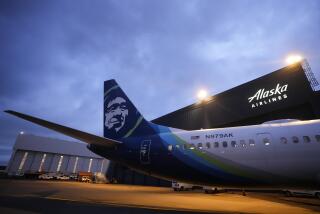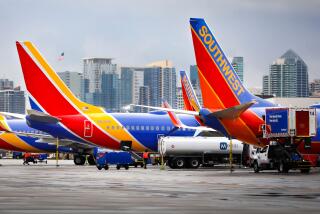Lear Will Fight Fine Against Piper : Accident-Probe Rules Violated, Air Safety Board Claims
- Share via
Lear Siegler Inc. said Wednesday that it anticipates a federal court fight over its refusal to pay a $160,000 government fine involving its Piper Aircraft subsidiary, because Lear believes the fine was based on “erroneous and inaccurate” attacks on its integrity.
Stephen D. Natcher, Lear Siegler general counsel, said the “negative allegations” against the Santa Monica-based firm’s conduct in federal accident investigations could eventually have a significant impact far beyond the small monetary fine if left unanswered. Natcher said the allegations could be used against Lear in future product-liability suits.
“We like to be pragmatic, but we have to stand up and realize that we have been unjustly accused,” Natcher said. “We feel that we have been wrongly singled out, castigated, and we just are not going to compromise.”
The fine was proposed last June by the National Transportation Safety Board against Piper Aircraft after a nine-month inquiry into whether Piper had violated federal laws covering federal accident investigation proceedings.
Ronald Battocchi, a senior attorney at the safety board, said that Lear’s refusal to pay the fine will be referred to the Justice Department with a recommendation for a federal court complaint against Lear.
As an aircraft manufacturer, Piper is frequently invited by the safety board to be a “party” to the official federal investigation of accidents involving its aircraft. Piper had appointed Aerospace Management Services International, a Texas accident-investigation firm, as its representative to the safety board.
Should Be Unencumbered
The safety board alleges that Piper had represented AMSI as its own independent agent when the firm was actually representing Piper’s product-liability insurer, U.S. Aviation Underwriters.
The allegation against Lear is significant because, under federal law, parties to a safety board investigation can have no connection with an insurance firm. The regulation is based on the theory that the safety board should be kept unencumbered in its work by litigation. Under federal law, NTSB findings cannot be introduced in civil litigation.
The designation of AMSI by Piper in 1984 immediately raised questions at the safety board, because AMSI is a wholly owned subsidiary of U.S. Aviation Underwriters. AMSI has since been barred by the safety board from any participation in future investigations.
Battocchi said that an examination of Lear’s records showed that AMSI’s charges to Lear were treated as part of the firm’s insurance deductible, and that once the deductible had been reached, there were no further charges to Lear. Such charges were billed to Piper through the insurance company.
In addition, Battocchi said that AMSI’s representation of Piper was part of an “unwritten condition of insurance” by U.S. Aviation Underwriters. The relationship was unstated because the parties knew that their failure to maintain an arm’s length status could be embarrassing, Battocchi said.
“Lear Siegler categorically denies the allegation,” Natcher said.
“We did not anticipate and it is not our purpose to dignify the NTSB findings with a point-by-point refutation.”
Natcher said Lear’s refusal to let such an allegation stand is based partly out of concern that such language “will be and has been used against Piper in product litigation. We don’t know the impact, but we feel it is significant.”
A letter dated June 11 from safety board Chairman Jim Burnett charges that Lear had misrepresented facts to the safety board, withheld information and made false statements.
“These records do not reflect favorably on Piper, demonstrating its participation with its insurer in a scheme to conceal from the board the full magnitude of AMSI’s concurrent representation of an insurer,” Barnett wrote.
More to Read
Inside the business of entertainment
The Wide Shot brings you news, analysis and insights on everything from streaming wars to production — and what it all means for the future.
You may occasionally receive promotional content from the Los Angeles Times.










